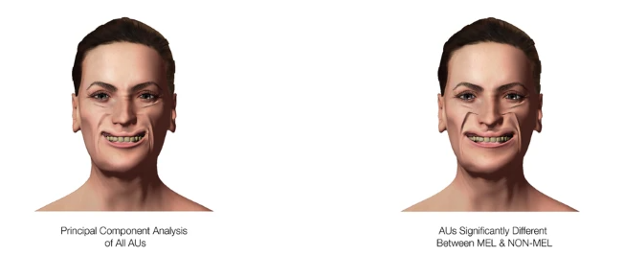Queensland scientists found that analysing the facial expressions of people watching a comedy routine was a reliable way to identify people with melancholia.
People with melancholic depression are less likely than their peers with regular depression to react to funny videos, according to new research out of the QIMR Berghofer medical research institute.
Another interpretation of the research is that people with melancholia just don’t like Ricky Gervais.
The study, which was recently published in Molecular Psychiatry, looked at both the physical facial expressions and the dynamics of sequential changes in brain activity in a population of 70 people with diagnosed depression as they watched two films.
The sample was enriched for people with symptoms of melancholia – i.e. high ratings of psychomotor slowness and anhedonia – who ultimately made up about 40% of the study population.
While there was already a body of work to suggest that individuals with melancholic depression tend to have a flat affect, existing classification systems tend to consider melancholia as an expression of severe depression rather than a distinct subtype.
It has now been proposed as a distinct subtype; the goal of the researchers was to show that there was a quantifiable way to detect differences between regular depression and melancholic depression, given that people with melancholic symptoms can respond better to biological therapies.
And they decided the best way to measure facial expressivity was to use webcam-captured footage of the study cohort watching an edited portion of British comedian Ricky Gervais’ 2003 standup special, Animals.
The possibility that being strapped to a chair and made to watch Ricky Gervais bits may be some people’s* idea of a Men Who Stare At Goats-style torture session even when they’re not depressed was not raised in the article.
There were six significant differences in facial expression across the depression and depression-with-melancholia cohorts.
People with melancholia were significantly less likely to use the muscles that wrinkled their nose, tightened their eyelids, caused dimples or raised their cheeks, and to use various muscles around the lip.

Come to think of it, these terrifying graphics are a reasonably accurate portrait of some people* watching Ricky Gervais.
MRI scans were also taken while the same cohort of participants watched a different movie – The Butterfly Circus, an emotionally charged short film about a man with no limbs who joins a circus.
Again, there were specific differences between brain state dynamics in the depression group compared to the depression-with-melancholia group.
“These findings are important because they suggest that melancholia differentially affects, relative to non-melancholic depression, the neural substrate responsible for processing ecologically valid multisensory stimuli and that this change manifests at the motoric level,” the researchers said.
Of the two experiments, the one examining facial features was more sensitive in differentiating melancholic and non-melancholic people.
“We know that standard ‘first-line’ treatments for depression may not always be as effective for those deeply affected by melancholia,” lead researcher Dr Philip Mosley said.
“If we can identify this type of depression more quickly and accurately, it will benefit not only patients, but their families and community, who may be devastated by the effects of treatment-resistant depression upon a loved one.”
This research, he said, will allow GPs to diagnose melancholic depression earlier.
The researchers acknowledged that Ricky Gervais would likely not be considered “funny” across other cultures and age groups.
But hey, just listen to the man himself.
*I am some people.
Send your story tips in standup form to Penny@medicalrepublic.com.au.


